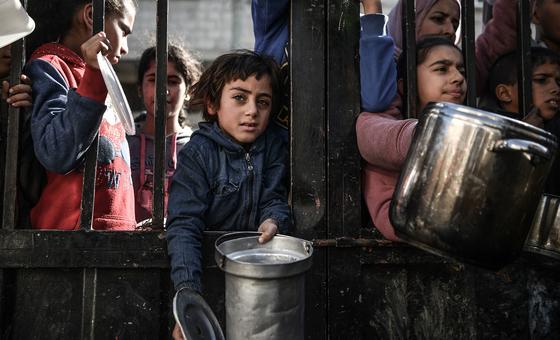Ongoing hostilities across the Gaza Strip have been “particularly intense” in the southern city of Khan Younis, UN humanitarians warned on Monday, as the UN agency for Palestinians, UNWRA, reported that its shelters were now four times over-capacity.
“There is simply not enough food,” UNRWA tweeted on social platform X, formerly Twitter, with photographs from another city slightly further north, Deir-al-Balah, showing people queuing “in the rain and cold” for relief supplies.
In its latest situation update, UN aid coordination office OCHA reported heavy fighting in Khan Younis close to two hospitals: Nasser – where many wounded patients have “no options for treatment amid ongoing heavy fighting and bombing”, citing Médecins Sans Frontières – and Al Amal – where the Palestine Red Crescent Society (PRCS) reported continuing bombardment of the immediate vicinity.
There were also reports of Palestinians fleeing south to Rafah “which is already overcrowded, despite the lack of safe passage”, OCHA said, as it noted no let-up in rocket fire from Gaza into southern Israel.
Collusion probe
Amid extremely serious allegations that several staff colluded with Hamas during the 7 October attacks on Israel, UNRWA insisted that it would do “whatever possible” to continue helping Gazans, as the largest aid organization in the enclave.
A probe has already been launched by the UN’s highest investigative body – the Office of Internal Oversight Services (OIOS) – while on Sunday, UN Secretary-General António Guterres insisted that any UN employee involved “in acts of terror will be held accountable”.
Of 12 individuals allegedly implicated, nine were immediately identified and their contracts terminated with UNRWA. One staff member was confirmed dead and the identities of the remaining two are being clarified.
On 17 January a full, independent review of the agency was also announced by UNRWA Commissioner-General Philippe Lazzarini.
At the same time, Mr. Guterres appealed to the countries that suspended funding to the UNRWA to reconsider their decisions, to at least ensure continuity of its vital humanitarian operations.
Famine looms
Echoing that call, UN World Health Organization (WHO) Director-General Tedros said in a post on X on Sunday that cutting off funding to UNRWA “will only hurt the people of Gaza”.
They face the looming threat of famine, disease and displacement after nearly four months of Israeli bombardment, prompted by Hamas-led terror attacks that left some 1,200 dead and more than 250 people taken hostage.
More than two million people in Gaza depend on the UN agency for their survival but its humanitarian operation “is collapsing”, warned Mr. Lazzarini on X on Saturday.
UNRWA usually has 13,000 staff serving Palestinian communities in Gaza. Today some 3,000 continue to work in a war zone, tasked with running shelters for over one million people, providing food and healthcare to civilians in dire need since the start of the conflict.
To date, more than 26,420 people have been killed in Gaza since 7 October, said UN aid coordination wing OCHA, citing data from the enclave’s health ministry. Some 1,269 Israeli soldiers have also been killed in clashes, according to the Israeli military.
“The people of Gaza have been enduring unthinkable horrors and deprivation for months,” the UN’s top emergency humanitarian official Martin Griffiths said on Sunday on X. “Their needs have never been higher – and our humanitarian capacity to assist them has never been under such threat. We need to be at full stretch to give the people of Gaza a moment of hope.”

